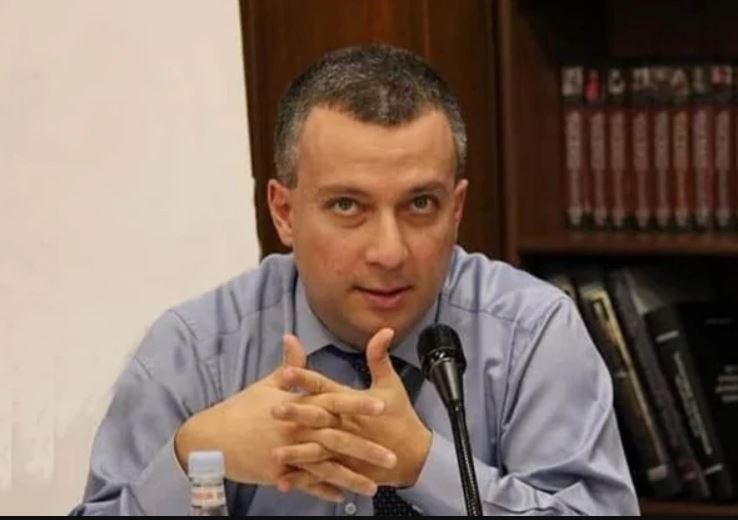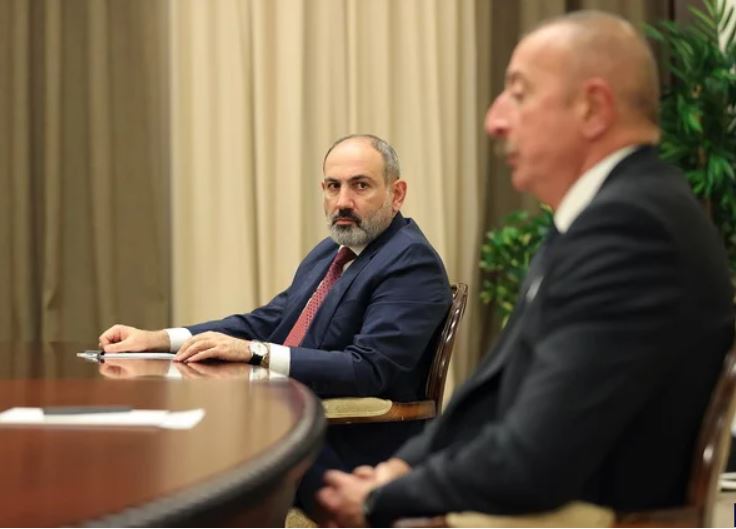by Benyamin Poghosyan
Following the military takeover of Nagorno-Karabakh by Azerbaijan in September 2023 and the forced displacement of Armenians, Azerbaijan has pursued a double-pronged strategy in negotiations with Armenia.
Its first approach has been to undermine Western-led Brussels and Washington negotiation formats while showing an interest in resuming negotiations on the Moscow or regional platform. President Ilham Aliyev canceled participation in the Granada summit of the European Policy Community in October and the scheduled tripartite meeting in Brussels facilitated by the European Council president, Charles Michel. In November, Azerbaijan rejected the United States’ offer to resume negotiations with foreign ministers in Washington. Baku explained its decision by claiming that the European Union, France, and the US have a pro-Armenian or anti-Azerbaijani stance. Simultaneously, Azerbaijan has several times expressed its readiness to resume negotiations in Russia or on regional platforms. President Aliyev met many times with Russian officials before the presidential elections of February 2024, while receiving Western officials only after the elections.
The second approach has been to push bilateral negotiations with Armenia without any mediators or facilitators. After September 2023, Armenia emphasized its willingness to continue negotiations on Western platforms based on the principles agreed in Prague in October 2022 and Brussels in May and July 2023. Armenia also agreed to launch the bilateral track to ensure smooth negotiation. Armenia and Azerbaijan reached an initial result on December 7, 2023, when they signed a statement on releasing prisoners of war and Armenia’s support for Azerbaijan to host COP29, the next United Nations climate summit, in Baku.
Read also

Benyamin Poghosyan
Bilateral negotiations have continued in 2024. Several meetings took place between the Secretary of the Security Council of Armenia and the assistant to President Aliyev on foreign policy. In February 2024, Armenian and Azerbaijani leaders met in Munich, in the margins of the Munich Security Conference, in the presence of the German Chancellor, and ministers of foreign affairs met in Berlin later in February. However, these two meetings cannot be considered as a resumption of Western mediation formats, as neither the Europeans nor the Americans were the organizers – or indeed were involved – in these talks.
The bilateral negotiations track continued in May 2024, when Armenian and Azerbaijani foreign ministers met in Almaty, Kazakhstan, at the invitation of President Kassym-Jomart Tokayev. Border delimitation and demarcation commissions, established in May 2022, held several meetings in early 2024. These resulted in Armenian forces withdrawing from areas along the Armenia–Azerbaijan border in the Tavush region, framed by the Armenian government as a part of the delimitation and demarcation process based on the 1991 Almaty declaration.
What are Azerbaijan’s primary goals in the current phase of negotiations? First, Azerbaijan wants to solidify the post–September 2023 status quo and remove the issue of Nagorno–Karabakh and the future of Nagorno-Karabakh Armenians from the negotiation process. Second, by boycotting Western negotiation platforms, Azerbaijan seeks on the one hand to prevent the growing involvement of the West in the region and on the other, by portraying itself as an anti-Western actor, to improve relations with Russia. The Kremlin views the Western platforms as another channel for the West’s penetration of the region and, thus, a threat to its vital interests there. In this context, Azerbaijan’s efforts to undermine those platforms are aligned with Russian interests.
Azerbaijan also prefers bilateral negotiations without facilitators or mediators because, given the power asymmetry between Armenia and Azerbaijan, they allow Azerbaijan to obtain more concessions from Armenia and reduce the political cost for Azerbaijan if Baku decides not to implement previous agreements. At the same time, Azerbaijan is using the bilateral format as a smoke screen. It depicts itself as a constructive player genuinely involved in negotiations to achieve lasting peace and stability in the region and thus can disguise its assertive and aggressive posture toward Armenia. Pursuing the bilateral track strengthens Azerbaijan’s narrative of the ineffectiveness of multilateral Western formats.
However, in these negotiations Azerbaijan is not seeking the signature of a comprehensive peace agreement. President Aliyev has effectively killed any possibility of signing such an agreement by stating many times that changes to the Armenian constitution are a precondition of any peace deal. It is obvious that while protests are underway against Prime Minister Nikol Pashinyan it will be highly challenging for the prime minister to push forward with constitutional change, as many in Armenia will perceive this as another concession to Azerbaijan.
Establishing an extraterritorial corridor to connect Azerbaijan with Nakhijevan via Syunik, another precondition set by Azerbaijan to the signing of a peace agreement, also impedes the process. Even if Armenia agrees to this demand, which is unlikely as the current government declares that the extraterritorial corridor is a red line for Armenia, Iran will do everything to prevent the establishment of the corridor, which Tehran views as a threat to its national interests. Thus, while publicly stating its interest in signing a peace agreement before the COP29 summit in Baku, Azerbaijan is taking action to prevent any possibility of reaching that goal. Azerbaijan may opt to sign a so-called framework agreement with Armenia, a high-level text of principles and statements, which will resolve nothing but help improve Azerbaijan’s global standing, allowing Baku to speak about COP29 as a “climate and peace summit.” It is highly likely that after this event, Azerbaijan will return to its policy of preconditions and blackmail of Armenia on issues such as the corridor, enclaves, the change of constitution, Western Azerbaijan, etc.
Azerbaijan aims to drag on negotiations indefinitely, using them to weaken Armenia by forcing additional concessions while reducing the West’s regional involvement. The ultimate goal is to see an incapacitated Armenia constantly under the threat of Azerbaijani aggression and forced to accept Azerbaijan’s and its allies’ dominance in the South Caucasus.
What could Armenia do in the face of this Azerbaijani strategy? First, while not refusing to take part in bilateral talks, Armenia could declare that Azerbaijan is using them as a smoke screen to push forward an assertive and aggressive policy toward Armenia. Second, Armenia could be even more vocal in condemning Azerbaijan for undermining the negotiations by imposing preconditions and could state that Azerbaijan is not interested in signing a peace agreement. Third, despite Yerevan’s previous agreement to sign a framework agreement with Azerbaijan, as indicated by the prime minister in November 2022, Armenia should refuse to sign an ambiguous framework agreement, which will only strengthen Azerbaijan’s current smoke-screen strategy and focus on a comprehensive agreement only.
As Azerbaijan continues to push forward the concept of Western Azerbaijan and prepares to publish the list of those Azerbaijanis who “were expelled from Armenia in 1987–1991” and whom Armenia should allow to come back, Armenia should bring up the issue of Nagorno-Karabakh and the future of Nagorno-Karabakh Armenians.
While these issues are likely not part of a peace agreement with Azerbaijan, they should be addressed, because no lasting peace or stability is possible for at least a few decades in a South Caucasus with an ethnically cleansed Nagorno-Karabakh. If this issue is not addressed, future generations of Armenians are likely to view the forced displacement of Armenians from Nagorno Karabakh as a humiliation and an historical injustice. This will prevent any possibility of genuine Armenia–Azerbaijan normalization, creating long-term instability.






















































